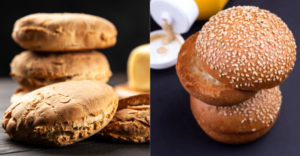Unlock the gluten-free pantry: uncover the surprising truth about corn flour’s gluten-free properties
What To Know
- To thicken soups or sauces, whisk corn flour with a small amount of cold water to form a slurry.
- Whether you’re thickening a sauce, coating a fried item, or baking a gluten-free treat, corn flour offers a myriad of culinary possibilities.
- Yes, corn flour is naturally gluten free and safe for individuals with gluten intolerance or celiac disease.
The gluten-free diet has gained immense popularity in recent years, with individuals seeking alternatives to wheat-based products to alleviate digestive issues and improve overall health. Among the many gluten-free substitutes, corn flour has emerged as a popular choice. However, the question remains: is corn flour gluten free? This comprehensive blog post delves into the intricate world of gluten and its presence in corn flour, providing you with the answers you seek.
What is Gluten?
Gluten is a type of protein found in wheat, rye, and barley. It gives these grains their characteristic chewy texture and elasticity. For individuals with celiac disease or gluten intolerance, ingesting gluten can trigger an immune response, leading to inflammation, digestive distress, and other health problems.
Is Corn Flour Gluten Free?
The answer is a resounding yes! Corn flour is naturally gluten free. It is made from finely ground corn kernels, which do not contain any gluten proteins. This makes corn flour a safe and suitable alternative for individuals on a gluten-free diet.
Benefits of Using Corn Flour
In addition to being gluten free, corn flour offers several benefits:
- Versatile: Corn flour can be used as a thickener in soups, sauces, and gravies. It can also be used as a coating for fried foods and as a breadcrumb substitute.
- Nutrient-rich: Corn flour is a good source of carbohydrates, fiber, and essential minerals such as iron, phosphorus, and magnesium.
- Affordable: Corn flour is widely available and relatively inexpensive compared to other gluten-free flours.
How to Use Corn Flour
Corn flour can be used in a variety of culinary applications:
- Thickening: To thicken soups or sauces, whisk corn flour with a small amount of cold water to form a slurry. Gradually add the slurry to the hot liquid, stirring constantly until thickened.
- Coating: For a crispy coating on fried foods, mix corn flour with seasonings and coat the food items before frying.
- Baking: Corn flour can be used in gluten-free baking recipes to add texture and structure. It can be combined with other gluten-free flours, such as almond flour or tapioca flour.
Is Corn Flour the Same as Cornstarch?
While both corn flour and cornstarch are derived from corn, they are not the same product. Corn flour is made from the whole corn kernel, including the germ, endosperm, and bran. Cornstarch, on the other hand, is made only from the endosperm, which is the starchy part of the kernel. This difference in composition results in different properties:
- Corn flour has a slightly gritty texture and a yellowish color, while cornstarch is finer and white.
- Corn flour has a higher nutritional value than cornstarch, as it contains the germ and bran.
- Corn flour is more versatile than cornstarch, as it can be used for both thickening and baking.
Can People with Celiac Disease Eat Corn Flour?
Yes, individuals with celiac disease can safely consume corn flour. It is an excellent gluten-free alternative that can be used in a variety of recipes. However, it is important to note that some corn flour products may be contaminated with gluten during processing or packaging. Therefore, it is essential to choose certified gluten-free corn flour brands.
The Bottom Line: Unveiling the Truth about Corn Flour
In the realm of gluten-free living, corn flour stands out as a versatile and nutritious substitute. Its naturally gluten-free nature makes it a safe and suitable option for individuals with celiac disease or gluten intolerance. Whether you’re thickening a sauce, coating a fried item, or baking a gluten-free treat, corn flour offers a myriad of culinary possibilities. Embrace the gluten-free revolution with corn flour, a trusted ingredient that empowers you to enjoy delicious and wholesome meals without compromising your health.
What People Want to Know
Q: Is it safe for people with gluten intolerance to eat corn flour?
A: Yes, corn flour is naturally gluten free and safe for individuals with gluten intolerance or celiac disease.
Q: Is corn flour the same as cornmeal?
A: No, corn flour is made from the whole corn kernel, while cornmeal is made from coarsely ground corn kernels.
Q: Can I substitute corn flour for wheat flour in all recipes?
A: No, corn flour does not have the same binding properties as wheat flour, so it cannot be used as a direct substitute in all recipes. However, it can be combined with other gluten-free flours to create gluten-free alternatives.
